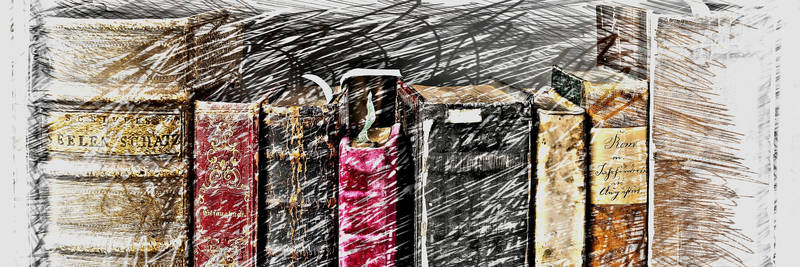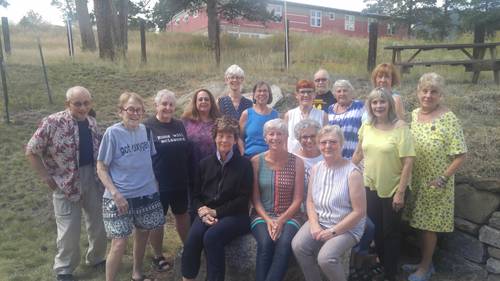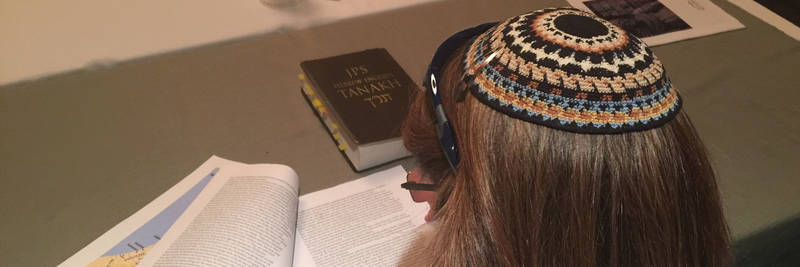Adult Education
Adult Education
Busy yourself as much as possible with the study of the divine things, not to know them merely, but to do them; and when you close the book, look around you, look within you, to see if your hand can translate into deed something you have learned. - Moses of Evreux
In seeking wisdom the first step is silence,
The second: listening,
The third: remembering,
The fourth: practicing,
The fifth: teaching others.
- Ibn Gabirol
Upcoming in Adult Education
-
Tuesday ,
DecDecember 2 , 2025 CBE Book Club
CBE Book Club
Tuesday, Dec 2nd 6:00p to 7:00p
Join us for a discussion about CBE's book of the month! -
Wednesday ,
JanJanuary 14 , 2026 Israel’s Strategic Position in the Middle East
Israel’s Strategic Position in the Middle East
Wednesday, Jan 14th 7:00p to 8:00p
This three-part course, Power Point program will briefly touch on the origins of countries surrounding Israel, and issues of water, natural resources, religion, and regional alliances. It will then examine Israel’s relations with its neighbors, along with threats to and opportunities for peaceful coexistence. It will speak to the Abraham Accords, what is evolving from them and which countries might be the next to join. It will discuss in some detail Iran and its proxies, how Israel broke through the “Iranian noose;” and bring matters up to the current moment in time.
CBE Book Club
 June: Songs for the Broken Hearted by Ayelet Tsabari. 1950. Thousands of Yemeni Jews have immigrated to the newly founded Israel in search of a better life. In an overcrowded immigrant camp in Rosh Ha’ayin, Yaqub, a shy young man, happens upon Saida, a beautiful girl singing by the river. In the midst of chaos and uncertainty, they fall in love. But they weren’t supposed to; Saida is married and has a child, and a married woman has no place befriending another man.
June: Songs for the Broken Hearted by Ayelet Tsabari. 1950. Thousands of Yemeni Jews have immigrated to the newly founded Israel in search of a better life. In an overcrowded immigrant camp in Rosh Ha’ayin, Yaqub, a shy young man, happens upon Saida, a beautiful girl singing by the river. In the midst of chaos and uncertainty, they fall in love. But they weren’t supposed to; Saida is married and has a child, and a married woman has no place befriending another man.
1995. Thirty-something Zohara, Saida’s daughter, has been living in New York City—a city that feels much less complicated than Israel, where she grew up wishing that her skin was lighter, that her illiterate mother’s Yemeni music was quieter, and that the father who always favored her was alive. She hasn’t looked back since leaving home, rarely in touch with her mother or sister, Lizzie, and missing out on her nephew Yoni’s childhood. But when Lizzie calls to tell her their mother has died, she gets on a plane to Israel with no return ticket.
Soon Zohara finds herself on an unexpected path that leads to shocking truths about her family—including dangers that lurk for impressionable young men and secrets that force her to question everything she thought she knew about her parents, her heritage, and her own future.
 August: Buried Rivers by Ellen Korman Mains. To the chagrin of her parents, Polish Jews who survived the Holocaust, the author became a Buddhist at the age of 19. More than three decades later, on a German train, Ellen felt the presence of spirits who had died in the Holocaust and had lost their trust in basic goodness. Sixty years after the liberation of Auschwitz, their plea for help sent her on a series of life-changing journeys to Poland to reconcile the Holocaust with basic goodness. Would years of Buddhist meditation prove helpful to her people instead of a betrayal?
August: Buried Rivers by Ellen Korman Mains. To the chagrin of her parents, Polish Jews who survived the Holocaust, the author became a Buddhist at the age of 19. More than three decades later, on a German train, Ellen felt the presence of spirits who had died in the Holocaust and had lost their trust in basic goodness. Sixty years after the liberation of Auschwitz, their plea for help sent her on a series of life-changing journeys to Poland to reconcile the Holocaust with basic goodness. Would years of Buddhist meditation prove helpful to her people instead of a betrayal?
In 2006, she travels to Poland, the Holocaust’s largest graveyard, and to her mother’s city of Łódź, to reconnect with her family's tragic history and later moves to Łódź to study Polish at a language school called “Babel,” where she is the sole American. With no living elders to consult, she relies on an account dictated by her uncle, an Auschwitz survivor, for clues to her family’s past. As she retraces her mother’s and uncle’s steps through Europe and walks in places where her ancestors lived for centuries, she stumbles into a mysterious stream of love—if only she can receive it.
 October: Tablets Shattered is Joshua Leifer’s lively and personal history of the fractured American Jewish present. Formed in the middle decades of the twentieth century, the settled-upon pillars of American Jewish self-definition (Americanism, Zionism, and liberalism) have begun to collapse. The binding trauma of Holocaust memory grows ever-more attenuated; soon there will be no living survivors. After two millennia of Jewish life defined by diasporic existence, the majority of the world’s Jews will live in a sovereign Jewish state by 2050. Against the backdrop of national political crises, resurgent global antisemitism, and the horrors of the Israel-Hamas war in Gaza, Leifer provides an illuminating and meticulously reported map of contemporary Jewish life and a sober conjecture about its future.
October: Tablets Shattered is Joshua Leifer’s lively and personal history of the fractured American Jewish present. Formed in the middle decades of the twentieth century, the settled-upon pillars of American Jewish self-definition (Americanism, Zionism, and liberalism) have begun to collapse. The binding trauma of Holocaust memory grows ever-more attenuated; soon there will be no living survivors. After two millennia of Jewish life defined by diasporic existence, the majority of the world’s Jews will live in a sovereign Jewish state by 2050. Against the backdrop of national political crises, resurgent global antisemitism, and the horrors of the Israel-Hamas war in Gaza, Leifer provides an illuminating and meticulously reported map of contemporary Jewish life and a sober conjecture about its future.
 December: Judaism's Ten Best Ideas by Art Green.
December: Judaism's Ten Best Ideas by Art Green.
In an age of fluid identity, many people are honestly asking the question "Why be Jewish?" What in this religious and ethnic legacy is worth preserving? Does Judaism have something unique to offer a contemporary seeker free to choose a way of life and a system of values?
Here is the answer of a leading spiritual teacher who has faced these questions in conversation with generations of students. With warmth, humor, personal and rabbinic stories and down-to-earth explanations, Arthur Green presents the ideas in Judaism that kept him loyal to the tradition passed on to him. The result is an enticing look into timeless Jewish wisdom that will encourage you to explore further and search out the riches of Judaism for yourself.
 February: The Shabbat Effect by Alan Morinis. One of the most important biblical mandates, so significant that it numbers among the Ten Commandments, is the directive to observe a weekly day of rest. The Shabbat Effect illuminates how the practice of a day set aside for rest brings about a deep, lasting, and pervasive transformation of character, not just on that seventh day but every day. Drawing on venerable Jewish sources as well as the experiences of contemporary practitioners, this user-friendly and accessible guide explores the eight essential traits that reflect the true meaning of Shabbat.
February: The Shabbat Effect by Alan Morinis. One of the most important biblical mandates, so significant that it numbers among the Ten Commandments, is the directive to observe a weekly day of rest. The Shabbat Effect illuminates how the practice of a day set aside for rest brings about a deep, lasting, and pervasive transformation of character, not just on that seventh day but every day. Drawing on venerable Jewish sources as well as the experiences of contemporary practitioners, this user-friendly and accessible guide explores the eight essential traits that reflect the true meaning of Shabbat.
Rooted in the 1,100-year-old Jewish tradition of Mussar as well as the experiences of contemporary practitioners, this accessible guide offers a radical and moving exploration of how the practice of Shabbat enhances and refines core traits of character. Readers will find that it contributes immeasurably to their enjoyment of life, as well as helping them fulfill their highest human potential.
Adult Hebrew

SHALOM!
Feeling rusty? Never learned but want to? Just curious?
Our new adult Hebrew program is geared toward those interested in gaining comfort, familiarity and potentially fluency in the Hebrew language and liturgy.
Explore modern conversational Hebrew and develop decoding text and prayer skills, this class meets Sundays in person and via Zoom 5-6PM. All levels welcome.
Register here to learn with CBE member Elizabeth Moore. Class fee is $54.00; the book is $28. Classes start October 13. See CBE calendar for specific dates.
Mussar

Meets year-round [almost] every Thursday, 1PM – 2:30 PM at CBE.
What is Mussar? Mussar is a traditional Jewish ethical-spiritual discipline that is in the process of being rediscovered in our time. The method guides us in bringing positive virtues or ‘soul traits’ to bear in our daily lives. This class has had on-going, enthusiastic attendance since 2008. Each session is divided into two parts. In the first hour, we combine text study, lecture and discussion around a particular midah [soul-trait], such as compassion, humility, joy, silence, honor, patience or gratitude. The second part of the class is devoted to supporting one another as one person volunteers to share a personal challenge or situation that they would like to approach from a mussar perspective. This class prompts curiosity about the attributes of divinity while offering insight into the human psyche, practical guidance for daily living and growing our moral-spiritual selves, and especially mutual support and friendship. Come and see why this class has attracted such a devoted following. And if you cannot make the midday time-slot, get on the e-mail list to receive weekly teachings to support your on-going study and practice.
Sat, November 29 2025
9 Kislev 5786
The midah of the month of November is Honor (kavod).
Useful Links
- Mi Sheberach Form (prayer list)
- Make a Donation
- Order a Yahrzeit Plaque
Today's Calendar
| Havdalah : 5:28pm |
Friday Night
| Candle Lighting : 4:28pm |
: 6:00pm |
Shabbat Day
: 10:00am |
: 12:00pm |
| Havdalah : 5:27pm |
Upcoming Programs & Events
Dec 2 |
Dec 5 |
Dec 6 |
Dec 6 |
Dec 13 |
This week's Torah portion is Parshat Vayetzei
| Shabbat, Nov 29 |
Candle Lighting
| Shabbat, Nov 29, 4:29pm |
Havdalah
| Motzei Shabbat, Nov 29, 5:28pm |
Shabbat Mevarchim
| Shabbat, Dec 13 |


